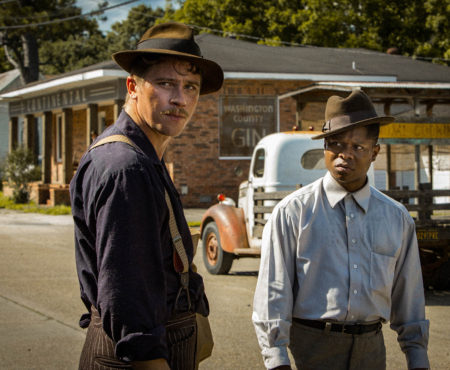Bitches be crazy, am I right? Always knocking on your door with some sad-sack story about getting left out in the rain, needing to use a phone, and then forcing themselves on you before going batshit insane. Jeez!
That’s the tone and premise of Eli Roth’s latest film, Knock Knock, a trashy home-invasion thriller in which two conniving femme fatales enter the home of a naïve family man while his wife and children are away for the weekend. It’s an intriguing departure for Roth, who’s made a name for himself directing gruesome bloodbaths such as Cabin Fever and Hostel. Yet despite drastically toning down on the gore in favor of a more psychological sense of dread, this recent effort is a muddled and contradictory piece of work.
Keanu Reeves stars as Evan Webber, the well intentioned dope who lets Genesis (Lorenza Izzo) and Bel (Ana de Armas) into his suburban residence on a dark and stormy night. Claiming that their cab dropped them off at the wrong house on their way to a party, Evan lets the ladies dry off in his living room and calls them an Uber. Initially, Genesis and Bel seem grateful for Evan’s hospitality, but before long, they begin to seduce him, and despite his various efforts to brush them aside, he gives into his sexual urges. The next morning, however, the two seductresses not only refuse to leave Evan’s home, but set off on a rampage of destructive behavior, resulting in a terrifying wave of consequences.
The film unfolds like a hybrid of Funny Games and Hard Candy, albeit in a much campier, sloppier fashion. The build-up is undeniably effective, with Reeves convincingly turning down Izzo and Armas’ advances to get him into bed. However, once Roth veers into chaos and attempts to convey his supposed social commentary, the picture becomes even sillier when it should be racketing up the tension.
It’s not that Roth isn’t aiming for a dark sense of humor – and certainly, there are some cheap laughs to be had amidst the film’s ludicrous twists and turns. The problem, though, is that as a psychosexual horror film, it’s not in the least bit scary, or even remotely clever in terms of what it’s trying to say. We’ve seen this cautionary tale handled more effectively numerous times before, and on top of that, the supposed condemnation of how men never say no to sexually promiscuous women is clumsily portrayed. Instead, the film dips its toes into misogynistic portrayals of women in general, and will likely be interpreted as such by many viewers.
This is what makes me so queasy about Knock Knock. David Fincher’s Gone Girl provocatively challenged our preconceived notion of gender roles and how they’re portrayed in the media. Here, Reeves is punished for his actions, but Izzo and Armas’ characters are so merciless in their attempts to prove he’s a pig that they even end up sexually assaulting him. And even before that, they threaten to call the cops and claim that Reeves raped them.
In a world where very few authority figures actually believe women’s testimonies when it comes to sexual assault, this just doesn’t sit well with me. Roth apparently doesn’t see the irony of how his female characters’ cartoonish behaviour ends up making them look like offensive stereotypes that justify men’s sexist fears of their gender. Gone Girl may have delved into similarly icky material – and it was at times difficult to justify those parts of that film as well – but at least it had more complex ideas on its mind. Hell, in comparison to Roth’s two antagonists, Fatal Attraction’s Alex Frost comes off as a feminist vigilante.
What also makes this film more befuddling to think about, in terms of its contextual ambitions, is that Roth hasn’t exactly constructed strong female characters in the past. In Hostel, Roth taunts his male protagonists who treat women like sexual objects, and in an interesting twist, reveals that the female characters used their bodies to lure the horny dudebros into various torture chambers for financial gain. Unfortunately, these women are little more than disposable, one-dimensional villains who all meet their end by the hand of the main character in the long run. Then, in Hostel: Part II, there’s the infamous scene where Heather Mattarazzo’s character is naked and hung upside down above a bathtub,while another naked woman lies with a sickle, slicing up Mattarazzo and orgasmically caressing herself in her victim’s blood.
Perhaps Roth made this film in response to these common criticisms. Knock Knock certainly aims to unnerve through a more psychologically violent approach, with what I assume is the director’s attempt at conducting radical politics. Sadly, Roth just isn’t a mature enough filmmaker to tackle these issues, and considering his troubling perspectives on gender roles from his previous work, it only makes me more skeptical on the sincerity of this picture’s moral compass. You’re best keeping the door locked when this one comes around.





















3 thoughts on “Sundance Review: “Knock Knock””
Horribly mislead, implying that the very idea of a women claiming false rape allegations is sexist/misogynistic or somehow devalues legitimate rape victims is idiotic. Many abusive wives/girlfriends do this to their partners as a way of psychologically controlling them or preventing from leaving a relationship. If the genders in this film were reversed, no one would be calling “sexism” and I find it very sad that you feel that you have to pull the sexism card in a desperate attempt to gather readers. Female antagonists aren’t default sexist characters and the disturbing things portrayed by females in many of Mr. Roth’s films isn’t about gender it’s about the disturbing things. You have your priorities backwards if you look past the slaughter of innocent people ( “But they were “dude-bros” that had a normal sex-drive so it’s okay if they die hur-dur!”) and then be outraged only by the fact that the slaughtering was done by a psychologically disturbed female. The point of the female characters being “1-dimensional” is silly because they act as antagonists in a “thriller/slasher” movie. What makes antagonists (regardless of gender) so scary/disturbing is not what is known about them, but what is not known about them, i.e the fear of the unknown and all that. Stop trying so hard to make out men to be despicable and evil.
perfect response
I like how you harp on Roth’s movie for being misogynistic, then just kind of ignore the fact that in Hostel Part II a hilariously evil stereotype of an “alpha male” literally gets his dick and balls cut off and then fed to a dog at the end, and you also just sort of ignore the fact that Knock Knock features Keanu’s male character being raped, but the film treats it as something that he should be punished for- since men obviously can’t REALLY be raped, of course.
Really unbiased, there. Roth treats everybody like crap in some way or another, and his films suffer for it.